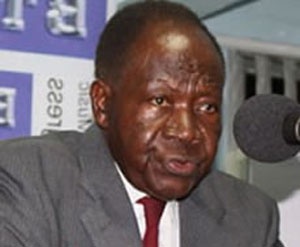Ghanaian Statesman, retired Diplomat and writer, Mr. Kwaku Baprui (K.B) Asante has asked Ghanaians to study in-depth the various customary practices in the country and maintain the parts that promote social values and moral order.
The Ga outdooring ceremony, “Kpojiem?”, for instance, he said, should not be emaciated or discarded in the name of Christian teachings and practices since according to him; the ceremony was not against baptism and should not be confused with it.
“There are other ceremonies and festivals in many parts of the country which deserve preservation and promotion. Our students and children should know and understand our customary way of life …we abandon what makes us distinct at our own peril,” he stated.
Mr. Asante was delivering the first of this year’s Kwame Nkrumah Memorial Lectures on the sub theme “How the fore bearers settled in this land. The free trade and its effects on the people”, at the University of Cape Coast (UCC) on Monday.
This year’s lecture series, tenth since its institution by the University in 1974 and inauguration in 1976, is on the theme, “Whence Ghana? Whither the Nation?”
Mr. Asante indicated that though apartheid had been discredited, racial inequality had not unequivocally been removed from our thinking, explaining that Africans by nature generally want to belong, hence the behaviour of some being akin to the whites.
“…the fluffy hair is straightened to look like the white man’s hair and the face and skin made light with oils and other preparations. Racial inequalities cannot be eradicated when the victims want to be like the oppressors, the 91-year old former Secretary of Dr. Nkrumah, stated.
He acknowledged the fact that the best in the self-acclaimed superiors should not be rejected, but he stressed that the practices and customs of Africans which enriches their human tapestry should be proudly prompted.
Mr. Asante recounted the slave trade period and the suffering the slaves went through, noting that although some Africans leaders were requesting compensation for harm done during the slave trade, he thinks no compensation would be sufficient.
On the struggle for the abolishment of slave trade, he stated that the accounts of history books had ignored the role of African fighters against the nefarious trade, creating the impression that Africans cannot do much without European assistance.
In view of this, he argued that it was time the true account of the African fight against the enslavement of body and mind be told, enumerating some personalities that were instrumental in the fight for freedom.
Mr. Asante pointed out that the effective answer to racial inequality was what he described as “African Achievement’ and reiterated the stance of Dr. Nkrumah that it was necessary for Africans to resume their native self-confidence and build viable, progressive and prosperous countries.
He expressed worry that many African leaders advertise their inferiority when they dealt with representatives of developed countries, adding that, indigenous leaders call for investment and grants from outside to assist without mobilizing local resources.
“They seem to have lost confidence in themselves…. The slave mentality should be abandoned,” he stressed.
He said Dr. Nkrumah, realized this and that at independence envisioned great expectations to be realized through self-confidence and self-reliance and that the country shall certainly overcome.
“With confidence, buttressed by resourcefulness and hard work, we shall certainly build a true and prosperous Ghana which we deserve and which we espoused at independence with Dr. Kwame Nkrumah,” he proclaimed, attracting applause and standing ovasion.
Prof Domwini D. Kuupole, UCC Vice Chancellor, in his welcoming address, said the lecture series was instituted in the memory of Dr. Nkrumah not only for establishing the University, but for the lead role he played in championing Pan-Africanism and the progress of the black world.
“The lecture series is therefore our way of paying tribute to this man, his vision, his nationality, his distinctive services to African’s globalism based on freedom and justice,” he stated.
General News of Thursday, 15 October 2015
Source: GNA
We abandon our customary practices at our own peril – K. B. Asante
Entertainment












